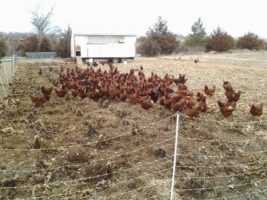Common Good Farm

| Rating |      |
| Farm/Brand Headquarters | Raymond, NE |
| Website | https://www.commongoodfarm.com/ |
| Market Area | NE |
| Total Score | 1660 |
Common Good Farm’s eggs can be purchased on-farm by appointment and in three markets in Lincoln, NE.
| Criteria | Points | Comment |
|---|---|---|
| TOTAL (possible score is 1700) | 1660 | 5-egg      |
|
Brands that have close daily control over their egg production receive the most points. Ownership Structure | 100 | Single farm that produces all eggs sold |
|
Brands that only produce organic products make the biggest investments — in time and money — in systems that benefit us all. Eggs sourced from a single operation receive the most points. Eggs of unclear origins and/or with poor oversight receives the fewest points. Commitment to Organic Label | 100 | Eggs come from single farm and farm only produces organic eggs |
|
Additional certifications, depending on the credibility of the label, can demonstrate a commitment beyond the organic standards. Other Labels and Standards | 100 | Real Organic Project; farm is certified Biodynamic, but the eggs are not |
|
Smaller flock sizes (the number of laying hens per housing structure) offer better animal welfare conditions. Flock Size(s) | 100 | High-welfare flock sizes, less that 500 hens per mobile house |
|
The best housing offers space for natural behaviors and legitimate access to the outdoors through adequate exits. Hen Housing and Exit Areas | 100 | Uses mobile housing |
|
Adequate indoor spacing reduces stress and disease. With less crowding, birds can stretch their wings and more easily perform other natural behaviors. Indoor Spacing | 100 | Excellent indoor spacing (mobile coops) |
|
High scoring brands provide enough space to allow each hen to fully utilize their outdoor area, and to perform instinctive behaviors without harming the environment. Outdoor Spacing | 100 | Excellent outdoor spacing in summer, 112 square feet/bird |
|
High quality outdoor access includes vegetation, soil, and ample opportunities to forage year-round. Quality of Outdoor Access | 100 | High quality outdoor time, rotated pasture; vegetation amount depends on where hens are and the season (runs hens through spent fields and treed areas) |
|
Birds that are introduced to the outdoors early are more accustomed to spending time outdoors without fear or stress. Outdoor Access Timing | 100 | 10 weeks |
|
Year-round access to perches, scratching areas, deep litter, novel foodstuffs, and dust bathing contribute to quality of life. Enrichments | 100 | High quality enrichments used indoors and outdoors |
|
Chickens use their beaks to interact with the world. Authentic organic farmers account for this behavior, eschewing beak trimming. Alterations | 100 | Brand does not allow beak trimming or forced molting |
|
Raising chicks on farm or buying them from certified organic hatcheries shows dedication to organic production from start to finish. Chicks and Pullets | 90 | Gets day-old chicks to raise |
|
Brands that have low rates of deaths and utilize their spent hens for human consumption or similar score the highest. Deaths, Culls, and Spent Hens | 90 | Death rate below 5%; hens used for human consumption or sold live as pets |
|
Brands that closely monitor and manage health of soil, native species, and water quality receive the most points. Environmental Impacts | 90 | Maintains vegetation, uses cover cropping methods, uses hens to build fertility, biodynamic principles |
| Feed Sourcing | 90 | Confirmed local sourcing; supplier sources certified organic grain from other certified organic Nebraska farmers & one grain processor who buys from area farms |
|
Brands that score well here go above and beyond to ensure the highest animal welfare, taking into consideration their hens’ safety and cleanliness, natural behavior, and stress levels. Animal Welfare | 100 | Excellent animal welfare |
|
Cornucopia believes you have a right to transparency. Top brands share information with Cornucopia via a survey and cooperate with our own independent investigations. Transparency | 100 | Full and open transparency |
| Soy free and/or gluten free? (non-scoring) | Not gluten or soy free | |
|
Brands do not receive points, but are invited to submit the name of their Accredited Organic Certifier (suppliers may have different certifiers). Organic Certifier (non-scoring) | OneCert | |
|
Extra credit is offered for various practices that go above-and-beyond in some form. Extra Credit | 0 | None |

